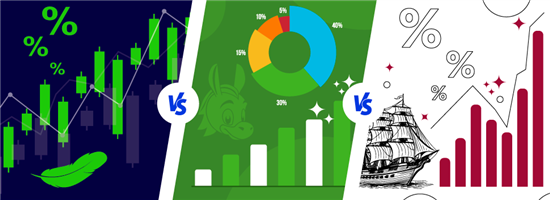Robinhood vs Fidelity vs Vanguard
Robinhood, Fidelity, and Vanguard are great options if you're looking for an investment platform to grow your money. But which one is right for you?
 |
Robinhood, Fidelity, and Vanguard are all good investment platforms that can help you grow your money. But what's best for you will depend on the type of trading you prefer.
Read on for a full breakdown and direct comparison of each platform.
Who Each Is Best For
- Robinhood is best for investors who are just starting out. You can trade with as little as $1. The clean, beginner-friendly user interface also makes it incredibly easy to get started.
- Fidelity is best for those looking for a full-service brokerage or those looking to deal with mutual funds. The platform has almost every tool, product, and account you'll ever need as an investor.
- Vanguard is best for long-term or passive investors who are saving for retirement. It's also great for those who like dealing with low-cost index funds and ETFs.
What All Three Offer
- Commission-free trades
- Stocks and ETFs
- Mobile/online trading
- Robo-advisor services
- Educational resources and research tools
How They're Different
- Robinhood offers unique matches on their IRAs (with a higher percentage if you're a Gold member).
- Fidelity and Vanguard offer a wide variety of tradable assets like mutual funds, bonds, CDs, and more. Robinhood only offers stocks, ETFs, options, and crypto.
Why Choose Robinhood?
Robinhood offers 100% commission-free trading. You can invest in stocks, ETFs, options, and cryptocurrencies for as low as $1. This makes it perfect for new investors who want to start with small amounts.
Robinhood also offers the only IRA with a match on top of your annual contribution limits.[2] This gives you a nice little boost to your retirement savings.
For more experienced investors, they have a premium account called Robinhood Gold at $5/month. With it, you get bigger instant deposits, more advanced research tools, and an even higher percentage match on your IRA contributions.
Robinhood has over 26 million users. The app is very beginner-friendly and highly rated on both the Google Play and App Store.
Drawbacks:
The biggest drawback of Robinhood is that its research isn't as extensive. It only offers basic research and analysis tools.
You get access to professional research from Morningstar with Robinhood Gold, but you'll need to pay their monthly fee for that. Even then, it's not as extensive as others.
Pros + Cons:
|
|
Robinhood Gold is worth it for margin traders, people who keep a lot of uninvested cash in their accounts, and those who take full advantage of IRA investing (because of its IRA match).
Why Choose Fidelity?
Founded in 1946, Fidelity is the most well-established among the three options. They're one of the biggest investment managers in the world with over 50 million users and $15.1 trillion in assets managed.[4]
Fidelity caters to a much broader range of investors. In addition to stocks, ETFs, options, and crypto, Fidelity also offers mutual funds, bonds, and more. The only assets you can't trade are futures and commodities.
You can do most of your trading at little to no cost on Fidelity. They offer online commission-free trades, have no trade minimums, and barely any account fees.
Want to be hands-off? They also have a robo-advisor called Fidelity Go. Fidelity will build a strategy based on your needs, automatically invest in mutual funds for you, and manage your portfolio.
Drawbacks:
Fidelity's in-depth research can be a little overwhelming for beginners. The same applies to their user interface.
Also, Fidelity has a few fees to take note of. This includes fees on option contracts, broker-assisted trades, and trading services offered via telephone.
Pros + Cons:
|
|
If you're just starting out, Robinhood has more beginner-friendly features that may make trading easier. However, if you're the type of investor who likes doing in-depth research before trading, Fidelity has more research and analysis tools that can help.
Why Choose Vanguard?
Vanguard was founded in 1975 and was the first to introduce index mutual funds for individual investors.[5] It offers a wide variety of investment products, including mutual funds, ETFs, individual stocks, bonds, and more.
The company offers a unique, client-owned structure. This means they aim to maximize your returns by minimizing costs. They even offer returns on idle cash by utilizing the VMFXX Federal Market Fund, which has an interest rate that is much higher than its competitors.[6]
Vanguard is built for long-term, buy-and-hold investors. The platform includes a ton of educational tools that help you set financial goals and create roadmaps on how to achieve them.
For the more active investors, Vanguard has the Digital Advisor. This is a robo-advisor that's designed for younger investors with basic goals of saving and investing.
Drawbacks:
Because Vanguard is built more for long-term investors, the platform lacks a lot of the tools an active trader will need. This includes charting tools and other research capabilities.
There's also no real-time news on Vanguard. This is because they aim for customers who have a long-term philosophy (which makes real-time news less relevant).
Pros + Cons:
|
|
Yes, Vanguard can be good for beginners. It has a lineup of over 276 mutual funds and the platform has established itself as a leader in giving investment options that are effective and accessible for beginners.
Direct Comparison
To give you a better idea of which platform will suit your trading style, here's a direct comparison between Robinhood, Fidelity, and Vanguard.
Fees
 | |||
| Visit Site | Learn More | Learn More | |
Robinhood | Fidelity | Vanguard | |
|---|---|---|---|
Get a Free Stock (worth between $5 and $200) - | Commission-Free Trading - Online Stock, ETF and Option Trades - | ||
| Stock Trading | |||
| Options Trading | $0 + $1-per-contract fee. Discounts available if you have more than $1 million assets invested in Vanguard ETFs and mutual funds | ||
| Cryptocurrency Trading | |||
| Annual Fee | |||
| Inactivity Fee | |||
| Maintenance Fee | $25/year. Waived if account owner signs up for e-delivery service, OR has an organization or a trust account registered under an EIN, OR enrolls in an advisory program, OR has at least $5 million in qualifying Vanguard assets | ||
| Visit Site | Learn More | Learn More | |
Blank fields may indicate the information is not available, not applicable, or not known to CreditDonkey. Please visit the product website for details. Robinhood: Pricing information from published websites as of 01/25/2025. Fidelity: Pricing information from published website as of 07/05/2024. Vanguard: Pricing information from published websites as of 10/17/2023. | |||
All platforms offer commission-free trading. This means there are barely any trading fees whenever you buy or sell an asset.
All three platforms are also free to use. Sign up, create an account, and you're ready to trade.
However, it's worth noting that Vanguard has a few account fees depending on the type of account you're using. Luckily, they offer ways for you to waive them.
Minimum Investment
Both Robinhood and Fidelity require no minimum investments. On the other hand, Vanguard has a few minimum investments you should take note of.
Investor Shares (Vanguard Target Retirement Funds and Vanguard STAR Fund) will require at least $1,000. Admiral Shares, on the other hand, will require at least $3,000.[7]
Robinhood and Fidelity offer fractional shares as low as $1 for stocks and ETFs. While Vanguard also has fractional investing as low as $1, it only applies to their selection of ETFs.[8]
Ease Of Use
Robinhood is the easiest to use for beginners. The user interface is incredibly intuitive, allowing you to pick it up and immediately start trading.
Fidelity takes the "one-stop shop" approach, offering all the tools you'll ever need as an investor. If you're an experienced investor, it'll be like a candy shop. However, the sheer amount of options and information may be a lot for beginners.
Vanguard's main platform, despite its basic interface, works for its target audience: passive and buy-and-hold investors. However, it could benefit from improved navigation and overall user experience.
If you're a complete beginner and don't want the burden of making all your investment decisions, all three platforms offer robo-advisor services. These can help you create investment strategies based on your goals and portfolio.
Tradable Assets
| Asset | Robinhood | Fidelity | Vanguard |
|---|---|---|---|
| Stocks | ✔ | ✔ | ✔ |
| ETFs | ✔ | ✔ | ✔ |
| Options | ✔ | ✔ | ✔ |
| Cryptocurrency | ✔ | ✔ | - |
| Mutual funds | - | ✔ | ✔ |
| Bonds | - | ✔ | ✔ |
| Fixed income funds | - | ✔ | ✔ |
| US Treasuries | - | ✔ | ✔ |
| CDs | - | ✔ | ✔ |
All three platforms let you invest in stocks, ETFs, and options. However, compared to Robinhood, Fidelity and Vanguard offer a wider range of securities.
If you invest in mutual funds, Fidelity may be your best bet. They offer over 10,000 funds from hundreds of fund companies, including over 3,000 no-transaction-fee funds (NTFs).[9][10]
Vanguard may be the best among the three if you're looking to invest in ETFs. Ninety-nine percent of Vanguard ETFs are traded at the midpoint of the quoted spread. This essentially means that their ETFs are generally considered to be the best price available.[11]
Robinhood may be the best if you're a beginner looking to invest in individual stocks or get started in cryptocurrency. It offers a beginner-friendly UI that makes DIY trading as simple as possible.
Account Types
| Account Type | Robinhood | Fidelity | Vanguard |
|---|---|---|---|
| Individual taxable account | ✔ | ✔ | ✔ |
| Joint account | ✔ | ✔ | ✔ |
| Traditional IRA | ✔ | ✔ | ✔ |
| Roth IRA | ✔ | ✔ | ✔ |
| Margin account | ✔ | ✔ | - |
| 529 College Savings | - | ✔ | ✔ |
| Account for minors | - | ✔ | ✔ |
| Robo-advisor | ✔ | ✔ | ✔ |
| Cash management account | ✔ | ✔ | ✔ |
| Paper trading account | - | ✔ | - |
Among the three, Fidelity has the most comprehensive offering of accounts. It has almost every type of investment account you'll ever need. This includes bank-like accounts like a Spend and Save account to more niche accounts like a 529 Plan or a Health Savings Account.
Though it's not as comprehensive as Fidelity, Vanguard also has a wide offering of accounts. On top of the ones mentioned above, they also offer Trusts, Spousal IRAs, 401(k)s, and more.
However, if you want to open an IRA, Robinhood may be your best option. They offer a unique IRA that matches every eligible contribution to your IRA.
Trading Platform
All three platforms let you trade via a web browser or mobile app. However, Fidelity is the only one with a desktop app you can download.
Fidelity's desktop app is for active traders (called Fidelity Trader+™ Desktop). It's free, has advanced charting with drawing, and can save orders to trade later.
You can customize Fidelity's desktop app with your preferred tools, colors, and font size. The interface is also very comprehensive. You can get real-time news, discover ideas with 45+ market filters, create up to 50 orders, and more.
All three platforms also offer extended trading hours:
- Robinhood: Robinhood 24 Hour Market, which lets you trade 24/5
- Fidelity: Pre-market: 7:00-9:28AM ET; After-hours: 4:00-8:00PM ET
- Vanguard: 4:00-5:30 PM ET on days when the exchanges are open
Order Types
| Order Type | Robinhood | Fidelity | Vanguard |
|---|---|---|---|
| Market order | ✔ | ✔ | ✔ |
| Limit order | ✔ | ✔ | ✔ |
| Stop limit | ✔ | ✔ | ✔ |
| Stop loss | ✔ | ✔ | ✔ |
| Trailing stop loss | ✔ | ✔ | - |
| Trailing stop limit | - | ✔ | - |
| One-triggers-the-other (OTO) | - | ✔ | - |
| One-cancels-the-other (OCO) | - | ✔ | - |
| One-triggers-an-OCO (OTOCO) | - | ✔ | - |
Robinhood only provides the basic types of orders. This makes it better suited for beginners with simpler investment approaches.
Because Vanguard is more focused on long-term, buy-and-hold trading strategies, they also only offer the basic types of orders.
Fidelity, on the other hand, provides more advanced conditional orders. These allow you to set order triggers for stocks and options based on price movement. This gives experienced investors more control over their trades to mitigate risk.
Research Tools
Although their educational and research tools vary in depth, all platforms offer resources for people who want to learn more about investing and/or personal finance.
Robinhood
Because it's made with beginners in mind, Robinhood only has basic research tools like:
- Side-by-side stock comparisons and stock filters
- Real-time market updates on stocks on your watch list
- Candlestick charts with 5 indicators
- Prices paid by Robinhood investors (per share)
If you have a Gold account, you'll get access to professional research from Morningstar. These include in-depth stock research reports, which cover over 1,700 stocks and are frequently updated.
- Business strategy: Initiatives a company takes to create value
- Economic moat: Ability to maintain an edge over its competitors
- Fair market value: The price the company would sell for on an open market
- Risk: Probability of losing part or all of your investment
- Leadership: The management behind the company
Fidelity
Fidelity offers advanced research and analysis tools such as:
- Quotes on individual stocks, company financial statements, key company statistics, and more
- Key information like a stock's earnings, growth rates, dividend yield, and more (customizable on Fidelity Trader+™)
- News and research reports
- Screeners for stocks, ETFs, and mutual funds
- Run searches based on your own criteria to help you find securities
- Find research tools from experts that'll match your investing style and let you see what experts are talking about
- See what's happening in specific markets and sectors, as well as set alerts for position-relevant news[12]
With Fidelity's free desktop app, Fidelity Trader+™ Desktop, you'll also get more tools you can use, such as:
- Real-Time Analytics: Identify trading opportunities with clear and actionable alerts
- Trade Armor: Visualize risks, define entry and exit strategies, and get alerts about price movements
- Daily Dashboard: Get position-relevant information like news, earnings announcements, and economic events in real time
Fidelity also has a Learning Center that has white papers, quarterly market and business cycle updates, investing ideas, and videos for more in-depth research.
Vanguard
In terms of research tools, Vanguard has a lot to offer:
- Screeners: Vanguard offers stock, ETF, fixed income, and mutual fund screeners (stock screener is limited in functionality)
- Charting tools: Charts are customizable but capacity is limited and technical analysis isn't available
- DIY tools: Vanguard offers tools and calculators that are centered around retirement planning (e.g., retirement planning worksheets, income calculators, "When to retire" tool)
- Third-party research: For registered clients, Vanguard offers free daily market reports and third-party research from Argus and MarketGrader
As for educational tools, Vanguard offers content like blogs, news articles, social media, commentary, research videos, and webcasts on retirement, industry news, financial planning, investment products, and the economy.
Most of their content focuses on helping you set financial goals and create plans of action to help you reach them.
Security/Compliance
Robinhood, Fidelity, and Vanguard are all SIPC-insured. This means your account is insured up to $500,000 (including a $250,000 cash limit) in case the brokerage fails.[13]
All three platforms also have supplemental coverage for amounts that exceed SIPC limits.
All platforms also have regulatory oversight. They also comply with KYC/AML laws.
Customer Support
All three platforms have available customer support to help you with any concerns you may have:
- Robinhood: via live chat 24/7 and phone 7 AM - 9 PM ET[14]
- Fidelity: 24/7 via virtual assistant and phone; Live chat available Mon to Fri 8 AM - 10 PM ET, Sat & Sun 9 AM - 4 PM ET[15]
- Vanguard: Available via phone[16]
Mobile App
| Robinhood | Fidelity | Vanguard | |
|---|---|---|---|
| Google Play | 4.2/5 stars(522,000+ reviews) | 4.6/5 stars(200,000+ reviews) | 3.1/5 stars(10,900+ reviews) |
| App Store | 4.3/5 stars(4.6+ million ratings) | 4.8/5 stars(2.9+ million ratings) | 4.7/5 stars(176,000+ ratings) |
In terms of customer feedback, here are some comments from their app store reviews:
Robinhood
Fidelity
Vanguard
Bottom Line
All three platforms offer great features and services that help you invest your money. However, what's best for you will depend on the way you like to trade.
- If you're just starting or don't have a lot of capital to invest, Robinhood is a great place to start. It has a beginner-friendly UI and offers fractional shares as low as $1.
- If you want a broad approach to investing, Fidelity is your best bet. They have almost every tool, product, and account type you'll need.
- If you're a long-term/passive investor who likes investing in low-cost index funds and ETFs, Vanguard will suit your trading style. They have retirement planning tools and resources that can help you create a path toward your financial goals.
References
- ^ Tech Crunch. Robinhood App Will Offer Zero-Commission Stock Trades Thanks To $3M Seed From Index And A16Z, Retrieved 11/22/2025
- ^ Robinhood. IRA match FAQ, Retrieved 11/22/2025
- ^ FINRA. FINRA Orders Robinhood Financial to Pay $3.75 Million in Restitution to Customers; Fines Robinhood Financial and Robinhood Securities for Anti-Money Laundering, Supervisory and Disclosure Violations, Retrieved 11/22/2025
- ^ Fidelity. Data and Insights: 2024 Annual Report, Retrieved 11/22/2025
- ^ Vanguard. Serving investors for nearly five decades, Retrieved 11/22/2025
- ^ Vanguard. Cash Investments, Retrieved 11/22/2025
- ^ Vanguard. Vanguard mutual fund fees and minimum investment, Retrieved 11/22/2025
- ^ Vanguard. What is dollar-based investing?, Retrieved 11/22/2025
- ^ Fidelity. Mutual Funds, Retrieved 11/22/2025
- ^ Fidelity. Mutual Funds Research, Retrieved 11/22/2025
- ^ Vanguard. Brokerage built for you, Retrieved 11/22/2025
- ^ Fidelity. Investment Research, Retrieved 11/22/2025
- ^ SIPC. What SIPC Protects, Retrieved 11/22/2025
- ^ Robinhood. How to contact support, Retrieved 11/22/2025
- ^ Fidelity. Customer Service, Retrieved 11/22/2025
- ^ Vanguard. Contact Us, Retrieved 11/22/2025
Fund and Get 4% Match Bonus
Enroll in this offer, and transfer or deposit $100,000 or more to your Webull account. Maintain a total net qualifying funding amount of $100,000 or more until the payment date of the final installment of the match bonus. The match bonus will be paid in 6 installments. The first installment will be issued on or about May 15, 2026.
$20 Investment Bonus
- Open an Acorns account (new users only)
- Set up the Recurring Investments feature
- Have your first investment be made successfully via the Recurring Investments feature
Invest in Real Estate with $10+
- Only $10 minimum investment
- Get a diversified portfolio of real estate projects across the US
- Open to all investors
Write to Iggi Vargas at feedback@creditdonkey.com. Follow us on Twitter and Facebook for our latest posts.
Note: This website is made possible through financial relationships with some of the products and services mentioned on this site. We may receive compensation if you shop through links in our content. You do not have to use our links, but you help support CreditDonkey if you do.
|
|
|
Compare:






